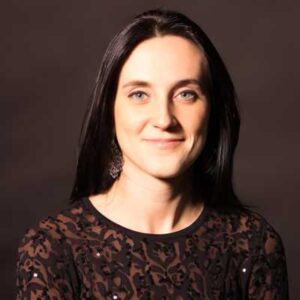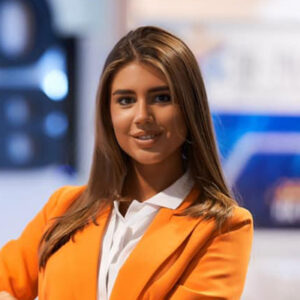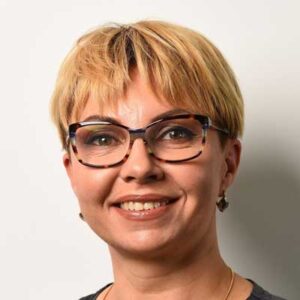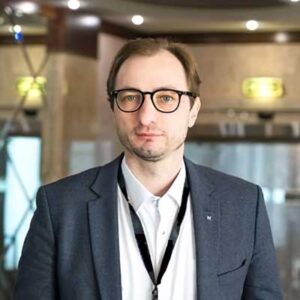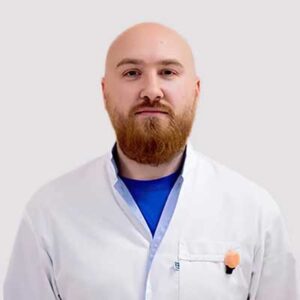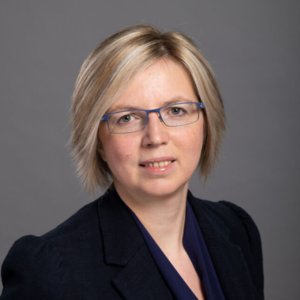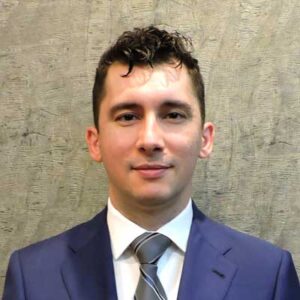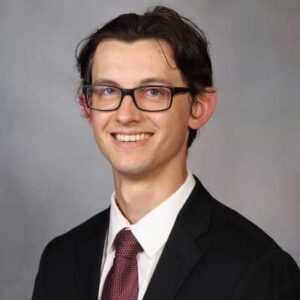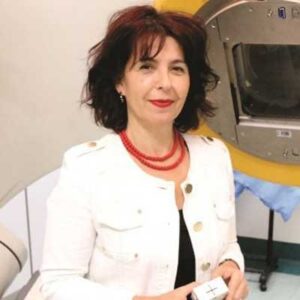Yuliia’s phone rings. She shows me the app warning of an imminent missile strike in her district in Ukraine, grateful that she does not need to respond—for the time being she is safe in the USA.
Dr. Yuliia Lozko is a radiation oncology resident at the National Cancer Institute in Kyiv. When the full-scale Russian invasion of Ukraine started on Feb. 24, 2022, Dr. Lozko evacuated from Kyiv to the relative safety of western Ukraine, to stay with her relatives. Now, her training continues with the radiation oncology department at Stanford University in a 6-month training and observership program.
Dr. Yuliia Severyn, a radiation oncologist also from Kyiv, but from the Ukrainian National Specialized Children’s Hospital, OKHMATDYT, arrived at Stanford for 3-months as a funded visiting scholar.
As approximately 75% of pediatric cancer patients have been evacuated from Ukraine, her department started treating adults, instituting and becoming the only department in Ukraine offering Total Body Irradiation (TBI) treated with Volumetric Modulated Arc Therapy (VMAT).
The experience-based knowledge and skills acquired at learning Stanford VMAT TBI technique will be invaluable when Dr. Severyn returns to her practice in Ukraine.


We are sitting in the Stanford Hospital café discussing the damage to health care caused by the invasion of Ukraine—something that is now happening almost in the background. It is difficult to put an exact value to it and, in any case, monetary value is not a good measure of damage to health care.
For ordinary Ukrainians, the damage to health care is being felt immediately. Those injured by war, both physically and mentally place an even greater demand on the crippled healthcare system.
The impacts of the war on the medical infrastructure in Ukraine has been staggering. In the first 200 days of war alone, according to Ukraine’s Minister of Health Viktor Liashko, more than 826 healthcare facilities were damaged. Of these, more than 127 were destroyed beyond repair.
However, the long-term consequences of the intentional damage of health care facilities goes hand in hand with the mounting civilian death toll and the current humanitarian disaster. Such a scenario is referred to as the “killing twice effect”(1) in the field of disaster medicine.
The nation’s ability to reconstruct after the war will be impacted for years, possibly decades, as a direct consequence of the abrupt interruption of education and livelihood of medical professionals, particularly those who are in training. The democratic world can support Ukraine to alleviate the impact of war by long-term planning, executing the plans and reducing the collateral damage to health care that would otherwise have a growing negative impact on the nation’s health and social recovery.


Sitting in the Stanford Hospital café, we also marvel how Ukrainians at home and abroad joined forces to help the homeland as much as they can. I recall the beginning of the full-scale invasion, where we started reaching out to Ukrainian cancer centers to inquire how we can help.
Together with oncology practitioners in U.S., Australia, and Ukraine, we formed Help Ukraine Group (HUG) aimed at supporting the cancer care hospitals and clinics in Ukraine in the time of war. One of our first contacts, Andriy Beznosenko, the chief medical officer of the National Cancer Institute (NCI), revealed he had been living in the hospital building with his medical team since the beginning of the full-scale Russian invasion and Kyiv was still surrounded by the Russian army.
For the NCI staff, it was safer to remain in the hospital 24/7 than stay at home and travel daily. Furthermore, the early and frequent curfew hours did not permit hospital staff to move around the city at will. Ukrainian men between the ages of 18 and 60 were not allowed to leave the country, so the NCI team consisted mostly of male oncologists who could not travel, holding the fort.
“Our female staff should be protected from bombing and shelling—some of them evacuated with their children to safer areas to stay with their families,” said Dr. Beznosenko. He proposed that since Ukrainian female oncology professionals had become displaced or refugees, there was a risk of de-skilling. To counteract this threat, he suggested to seek the opportunities for visiting scholars to enable “professional refugees” to gain valuable experience and bring it back to Ukraine when it became safe and the war is over.
This goal became one of HUG’s missions—to invest in the long-term health care capacity of Ukraine by finding placements for Ukrainian doctors and allied health professionals in safe educational havens, to continue developing their skills.
Dr. Beznosenko collected CVs from female physicians in a range of specialties, including radiation oncologists, medical oncologists, surgeons, anesthesiologists, pathologists, etc. Some were already displaced as the result of the war but were interested in the opportunity to travel abroad to a safe location to train and observe with the aim of improving their professional skills.
Ruslan Zelinskyi, president of the Ukrainian Association of Medical Physicists, complimented the list of medical practitioner candidates with a list of medical physicists.


So far, HUG has secured 11 out of 30 projected training positions: in USA with Stanford University, Mayo Clinic, University of Washington, Brown University, Brigham and Women’s Hospital, Harvard Medical School; in Australia with the ICON Group Cancer Centers, Peter McCallum Cancer Centre; in Canada with Princess Margaret Hospital.
Each are inviting Ukrainian oncology professionals, usually female, to train for 3-6 months. We call on more institutions to contribute to the project, secure funding and exhibit professional collegiality and advocacy in practice.
Ukraine has 45 medical schools accredited by the World Health Organization and UNESCO, making it one of the world’s most popular and accessible destinations for medical training. It ranks fourth in Europe for the number of graduate and postgraduate specializations in the field of medicine. Understandably, with the backdrop of war, Ukrainian medical academic institutions, including the medical researchers and clinicians they employ, are under considerable stress to address acute medical care needs.
When medical schools in Ukraine have supported such a large sector of international students, the impact of war has implications, not only on the supply of new medical doctors for Ukraine, but also for the international communities they supported.
President Volodymyr Zelenskyy recently addressed medical academics and spoke of the need to bring new knowledge, emerging practices and new skills back to Ukraine to foster regeneration and expansion of medical healthcare delivery supported by custom designed infrastructure.
This approach has a precedence during the Second World War, when a Polish School of Medicine in exile was established at Edinburgh University in Scotland. Polish medical scientists and doctors trained in Edinburgh during the war, and then in peacetime, returned to help rebuild academic medical institutions in Poland.
There are more recent examples of such a model. Twenty Ukrainian medical students from Kharkiv, whose training was thrown into turmoil by the Russian invasion, began clinical training at hospitals around Cambridge, England, to continue learning vital skills to help support Ukraine’s health service. Medical teams at Banner Health in Phoenix are helping nurses and doctors in Ukraine with virtual training.


In the case of radiation oncology, Ukraine needs support in modernizing the training for radiation oncologists and medical physicists, as the training in Ukraine is still based on Co-60 technology. However, increasingly more advanced linear accelerators, capable of Intensity Modulated Radiotherapy (IMRT)/Volumetric Arc Therapy (VMAT), are being installed and used.
HUG members are creating educational materials for transitioning from 3D to Intensity Modulated IMRT/VMAT treatment planning and delivery. Rayos Contra Cancer’s training videos were donated to HUG for translation into Ukrainian.
Major radiotherapy vendors, Varian and Elekta, have recently provided training courses for Ukrainian radiation therapy professionals, addressing the foundations of modern radiotherapy with IMRT/VMAT capable machines.
We call on all professional organizations and vendors to open access to annual meetings, educational resources, training courses and materials to Ukrainians to help them bridge the gap in training, while the war is raging. This is something we can do at very small cost, but with a huge impact for cancer patients and their quality of life. Ultimately, whether there is war or not, people will be diagnosed with cancer and this most vulnerable sector of society should expect optimal health for all.
For the Ukrainian radiation oncology trainees at Stanford, the aim is to become competent with the latest technologies, including Volumetric Modulated Arc Therapy (VMAT), High-Dose-Rate (HDR) brachytherapy, stereotactic radiosurgery (SRS), Stereotactic Body Radiotherapy (SBRT).
The scholars are observing contemporary workflow practices at Stanford, safety measures, radiotherapy treatment planning, basics of dosimetry and medical physics, participating in chart rounds and tumor boards, and attending lectures and seminars.
They follow the entire therapeutic process from the moment a new patient is admitted until they complete their treatment and followed-up as part of the survivorship program.
We are grateful to the American Society for Radiation Oncology (ASTRO) for providing free registration for the scholars to attend the 2022 annual meeting in San Antonio, and to the St. Jude’s SAFER for Ukraine program for sponsoring a week-long training for the scholars to observe proton therapy treatments.
“In Ukraine, many of the new techniques in radiation oncology are just being deployed, and the doctors don’t have a lot of experience in them,” says Dr. Yuliia Lozko. “My whole radiation oncology residency in Ukraine was supposed to be 6 months, in contrast to the typical 5-year radiation oncology residency in U.S.
“I feel a huge difference between myself as a resident and my American peers. But I will spend 6 months here at Stanford in the program packed with facts, skills, and technologies—all at my fingertips—all of which I can bring home and share with my colleagues. I hope to have additional opportunities to continue to improve.”
Access to modern technology makes Dr. Yulia Severyn excited and proud to be at Stanford Medicine. “Here you get to see how radiation therapy can be improved with the most up-to-date techniques,” says Dr Severyn. “I listen to lectures from the Stanford faculty and see the possibilities for different cases and follow-ups, and I think, ‘We can do this. We could save so many additional lives in Ukraine.’”
After the program at Stanford, Drs. Severyn and Lozko both want to return to Ukraine and teach other doctors about modern radiation oncology and groundbreaking research and technologies they have seen and experienced. Dr. Lozko also wants to start international virtual workshops and lectures for medical students and residents for a range of oncology specialties, so they can continue learning despite the war.
Although Dr. Lozko is enjoying her time at Stanford, Ukraine’s troubles haven’t left her mind. With every missile alert on her phone, day and night, she thinks of her family, colleagues, neighbors, and friends.
“Ukraine is bleeding, but Ukraine is an anchor of hope for the world. We will rebuild and be better than before — including our doctors.”
Together, we can make a difference.
References:


